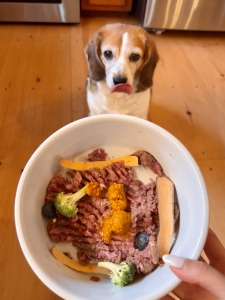Should I Feed My Pet Fresh Fruits & Vegetables?
Should we be adding fresh fruits and vegetables to our pet’s meals?
It seems like every week, we hear one thing and the next week it changes (like the great butter vs margarine debate). When it comes to our pets, nutrition is almost like a religion with many different beliefs and philosophies. Unfortunately, many of these arguments are based more on emotion than science. Although there is scientific evidence to support various nutrition philosophies, the interpretation of evidence can lead to potentially unsafe practices.
To make matters worse, marketing practices can further confuse pet owners and veterinarians, leaving them unable to distinguish fact from fiction. Despite this, we have seen significant shifts in recommendations for both humans and pets and diet-related diseases like insulin-dependent diabetes and obesity cannot be ignored. In humans, there is ample evidence to support a causal relationship between high intake of processed foods (containing refined carbohydrates/sugars) and insulin-dependent diabetes, obesity, and other metabolic-related diseases. It makes sense that we would worry about the same issues in our pets, considering that most dry pet foods contain between 40-60% refined carbohydrates.
Can Pets Digest Carbohydrates?
We know vegetables are important in the human diet, some more nutritionally beneficial than others, and the same applies to our pets. While the debate amongst many within the pet nutrition industry may disagree – our dogs are not wolves (read more here), and they can digest carbohydrates. While the ability to do this varies between various breeds, the focus of this blog isn’t the ability of our pets to digest carbs – instead, it is the benefits they obtain from fiber, antioxidants, and other phytochemicals contained within fruits and vegetables.
Our canines & felines need muscle meat, organ & bone partly due to the bioavailability of amino acids and other nutrients. If you were to give your dog the option of meat or plants/vegetables, studies show they would choose meat. However, when offered together, most dogs and some cats will consume fruit or vegetables too. Some trial and error with various cooking methods, chopping, mincing, or even blending in a food processor may entice those who may be pickier.
Why Supplementing Your Pet’s Diet with Vegetables is Important
As a pet owner, you may wonder if it’s necessary to supplement your pet’s diet with vegetables, especially if they don’t seem to like them. After all, isn’t pet food already complete and balanced? While pet food does provide the necessary nutrients, adding vegetables to your pet’s diet can provide additional benefits.
Vegetables and plants are abundant in vitamins, minerals, carbohydrates, fiber, and even beneficial bacteria. However, for pets that primarily consume canned and/or kibble food, adding fresh plant-based foods can provide protective benefits. Canned and kibble foods tend to have high levels of carcinogenic chemicals called advanced glycation end products, or AGEs.
The Negative Effects of AGEs
AGEs are naturally present in animal-based products, and additional AGEs form during the cooking process. Since dogs and cats primarily eat these types of food their entire life, their toxic load is much higher as a result. Toxic loads can negatively impact various organ systems, overall health, and even shorten the lifespan of pets and people.
The good news is that antioxidants and other phytochemicals present in fruits and vegetables, particularly leafy greens and berries, help to ward off some of the negative effects of AGEs. By adding fresh, organic, raw, or lightly cooked plants and veggies to your pet’s diet, you can help to reduce the toxic load and improve their overall health.
The Limitations of Commercial Pet Food
Even the best raw, kibble, or dehydrated foods lack the benefits of fresh, organic, raw, or lightly cooked plants and veggies. By supplementing your pet’s diet with fresh plant-based foods, you can help to provide a well-rounded and balanced diet that supports their health and well-being.
Fruits and veggies you can feed to your pets include:
- Leafy greens (rotate for variety)
- Green beans
- Broccoli/Cauliflower
- Summer squash
- Blueberries
- Watermelon
- Pineapple
- Apples
….just to name a few!
What Foods are Safe for Dogs and Cats?
While there are only a few things dogs and cats can’t have, quantity is what matters. Here are some guidelines to keep in mind:
- Monitor Onion Intake – Large amounts of onions can cause Heinz body anemia in pets, but small amounts in tomato sauce are usually fine. Garlic is safe in moderation and may benefit the immune system, while also serving as an effective flea & tick preventative.
- Avoid Grapes and Avocados – Grapes and avocados may affect pets differently, so it’s best to avoid them altogether.
- Experiment with Fruits and Vegetables – It’s okay to experiment with new fruits and vegetables one at a time, and observe for any adverse reactions. Fresh and healthy table food can be shared with your pet in moderation.
- Cats and High-Starch Foods – For cats specifically, avoid high-starch foods like potatoes, pumpkin, and grain-based products. Cats lack adequate enzymes to digest carbohydrates. Instead, focus on low-starch vegetables that are rich in antioxidants to support their digestive system.
How much to add?
These additions for cats should be kept low, however, they can be added to dog’s diets in greater amounts. Cats should consume no more than 5%, and dogs should be no more than 15-20%.
*This article is for informational purposes only. It is not meant to provide medical advice or replace the advice of a qualified veterinarian.
About the Author: Nicole Cammack
Nicole is the founder & owner of multiple-award winning NorthPoint Pets & Company, in Connecticut, USA. She has completed undergraduate work in biological sciences, business and holds an M.S. in Nutrition. Currently, Nicole is pursuing a PhD in Comparative Biomedical Sciences (Canine Nutrition/Metabolomics) at the prestigious University of Georgia in the USA.
Her background includes experience in the pharmaceutical industry on multiple R&D projects and has had the privilege to learn from leading figures in the human and pet health industries. Nicole has been heavily involved in police canine nutrition within the USA, helping to improve the modern care and feeding of working dogs. Her interests include working dog nutrition, raw feeding, pathogens, metabolomics, and nutrition’s relationship to disease in humans and canines. Her current research involves the exploration of the canine urinary metabolome and the relationship to diet.
Publications: Cammack, N.R., Yamka, R.M., and Adams, V.J. (2021). Low Number of Owner-Reported Suspected Transmission of Foodborne Pathogens From Raw Meat-Based Diets Fed to Dogs and/or Cats. Frontiers in Veterinary Science 8. doi: 10.3389/fvets.2021.741575.
https://www.frontiersin.org/articles/10.3389/fvets.2021.741575/full
Contact:
https://www.linkedin.com/in/nicole-cammack-8400084b/?trk=author_mini-profile_title





